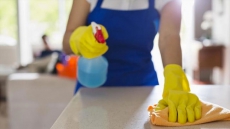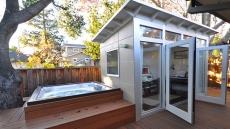Physics students at Kwantlen Polytechnic University (KPU) will soon be able to conduct actual lab experiments in an actual lab from the comfort of their actual homes—or anywhere with an actual Internet connection.
Beginning this spring, KPU students at the university's Richmond campus will use an online platform to perform lab activities in the real world in real time with highly specialized equipment located at the Remote Web-Based Science Laboratory (RWSL) at North Island College, created by NIC’s Albert Balbon, the lab’s award-winning architect. This marks the first time a Canadian post-secondary institution has used remote web-based science lab technology to pilot a physics course.
“This is unlike anything that’s ever been done at KPU or any other Canadian university,” said physics instructor Dr. Takashi Sato. “Students aren’t simply logging in to a virtual environment; thanks to this technology, they are actually controlling equipment in another location from the comfort of wherever they choose to study.”
Run by Sato and fellow physics instructor Jillian Lang, the research-validated remote labs remove a barrier for students who do not have easy access to post-secondary science lab courses. KPU physics students have worked with the RWSL in the past on a trial basis and it was so successful that Lang and Sato were eager to work with this technology again.
Working scientists already do much real science in this way, including controlling the Mars rovers, deep sea submersibles, telescopes, and drones. KPU is simply applying the technology to give students the advantages of using remotely controlled lab equipment.
“We are using cutting-edge made-in-BC technology,” said Dr. Fergal Callaghan, head of KPU’s physics department. “This is just the beginning of an ever-expanding and evolving set of remote labs,” he adds.
Added Lang: “We want to make physics more widely available to a variety of types of students, but not at the risk of losing the essential role of laboratory work, learning how science applies to the real world. Remote science labs allow students to interact with real physical systems without the artifice of simulations.”
With the aid of robotics, for example, students can operate a real cart on a real ramp, and then predict and measure acceleration as if they were there. They can also modify electric currents and magnetic fields with the “flick of a switch” using the computer mouse while viewing the equipment on their computer screen and seeing the actual electron change paths instead of just a simulation of an electron.
Sharing a single lab and its equipment with other scientists significantly cuts down on costs. Meanwhile, accessing a work space from anywhere with an internet connection is convenient for students, scientists, and researchers, and for students, they benefit additionally from early exposure to what they will likely encounter if they pursue science as a profession. Further, students are provided with modern “home-kits” that allow them to acquire various types of data in real time, so they can measure a wide range of physical quantities including force, distance, time, velocity, acceleration, light, sound and magnetic fields.
Students will continue to take the classroom portion of the course face-to-face with Lang and Sato, with the long-term goal of providing entire courses outside the traditional classroom and lab. A balanced combination of real remote labs, online simulations, and hands-on lab work won’t sacrifice the full experience of scientific enquiry while improving access to higher education courses.
“Most importantly, students will be supported by an experienced team,” said Sato. “We will be paying close attention to ensure student success.”




